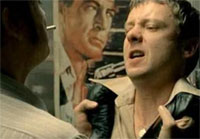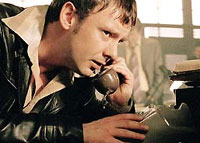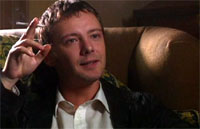June 5, 2006
In the world of television, the people are represented by two separate yet equally important groups: the writers and producers of hour-long crime dramas, and the viewers, who watch said dramas. These are their stories.
Be Careful Out There
"He's in the Best-Selling Show"
The BBC's Life on Mars
Sailors fighting in the dance hall
Oh man! Look at those cavemen go
It's the freakiest show
Take a look at the Lawman
Beating up the wrong guy
Oh man! Wonder if he'll ever know
He's in the best selling show
Is there life on Mars?—"Life On Mars," David Bowie
 |
Sam's real problem — aside from the creepy girl from the television who seems to be haunting him — is that he's a modern cop living in a retro world, with the accompanying soundtrack. (This is of the good — for the audience.) No instant forensics, no fiber analysis, no internal affairs, no cell phones. Just intuition, fists and fury, and the long arm of the law wreaking havoc on the local thugs and hooligans. (This, oddly enough, is of the bad — but only for Sam).
Doesn't this sound marvelous? No? Well it is.
Life on Mars takes the basic premise of an old-fashioned cop show — a throwback to Starsky and Hutch (and the British alternative which I'm given to understand is called The Professionals) and other shows about low-life criminals, snazzy cars, and questionable fashion choices (whoda thunk Miama Vice wasn't a trendsetter?) — and gives it a twist. Sam Tyler (John Simm) is a detective with our modern sensibilities forced (somehow) to function as a copper with 1973's attitudes and resources. And, as if not knowing about the whole crazy/coma/time-travel thing wasn't bad enough, he's decided to try to update the Manchester police force with his modern methods.
| Chaos ensues.
Actually, chaos is the norm. Sam ensues. |
Actually, chaos is the norm. Sam ensues. In his earnest desire to have the division run like it would in his own time, he comes off as sort of adorable and quaint and annoying to the other detectives who think he's nuts, particularly his boss, DCI Gene Hunt (Philip Glenister). Gene mostly believes in talking with his fists, but he's a sheriff at heart, interested in catching the criminal and protecting his city, whatever the cost.
None of this gets in the way of rollicking good storytelling, plenty of hero angst, and the ability to zip around in fast cars and talk trash. But the show's got layers, man, lots and lots of layers. And it's subtle. While Sam goes on and on about modern policing methods, he doesn't do much about the rampant sexism and racism of 1973. His closest friend, WIC Annie Cartwright (Liz White), mostly gets treated like a serving girl, and while Sam gives her assignments and asks for her opinion — flaunting her education and knowledge in front of the others — he never verbally defends her, never tells anyone else to lay off. It's a nice edge to the character; that dedication to duty is worthy of defense, but attitudes towards sexual and racial equality are things to be accepted as products of their time.
 |
In fact, I'd venture to say that the look and sensibility of the show (aside from the "is he crazy or a time traveler?" possibility) is far more familiar to American viewers than it might be to Brits. I'm guessing that they're far more used to seeing cops with cell phones and shiny computers, while we still have this vague notion that no one in England knows how to use a remote control. It'd be interesting to find out how jarring the 70s visuals are to the audience for whom this show was designed, because I didn't find myself jarred at all. In fact, the modern tech, and the clean, cold lines of the modern police station seemed far more off-putting.
| Manchester is a character in and of itself, is essential to the quality of the show and the unfolding events, and is intimately tied into the reasons Sam is "there," whatever "there" turns out to mean. |
Life on Mars actually address several of the concepts that I outlined in my last column (place in procedurals and how that shapes them; taking the cop show out of the realm of formula and reinterpreting it) and explores them with a darkly humorous edge, some funky bell bottoms, and Sam Tyler, the little boy lost.
| Here, Sam can take all of the experience he has with that type of crime-solving and the perception of infallibility that accompanies it, and place it onto a time that had none of that, and still had to maintain law and order. |
And it also allows for the show to have a slow, subtle arc. Every week, the boys solve crimes, and every week, Sam still doesn't know what the hell is going on aside from flashes of a potential memory, sounds of hospital machinery and people calling his name, and the creeptastic little girl and her teddy bear that come out of the TV, encouraging him to end it all.
If all this wasn't enough, if the show wasn't the perfect epitome of post-modern storytelling — reflecting audience sensibilities, trends of the time, and self-reflection — Life on Mars also uses its soundtrack to layer in clues to what's going on. The show doesn't use music to set the mood so much as to reflect the mood. And the accompanying site, Life on Mars from the BBC, lists the tracks played in the order they appear during the episode.
For instance, here's the playlist from the first ep:
- "Life On Mars" by David Bowie
- "Stairway To The Stars" by Blue Oyster Cult
- "I'm So Free" by Lou Reed
- "Baba O'Riley" by The Who
- "Rat Rat Blue" by Deep Purple
- "Fireball" by Deep Purple
- "White Room" by Cream
Sam gets kicked back to the past while "Life on Mars" plays first over his iPod, then through the 8 track in the car that hit him.
Sailors fighting in the dance hall
Oh man! Look at those cavemen go
It's the freakiest show
Take a look at the Lawman
Beating up the wrong guy
Oh man! Wonder if he'll ever know
He's in the best selling show
Is there life on Mars?
Sam's just picked up the wrong guy for murder, and as a result of the mistake, his girlfriend (a fellow police officer) has just been kidnapped after following up her hunch that the man they picked up could still provide answers.
 |
The second season is coming to the BBC in 2007, and I, for one, can't wait to see it.
Email the author.
Return to Season 2, Episode 18.
All written content © 2005-2006 by the authors. For more information, contact homer@smrt-tv.com
